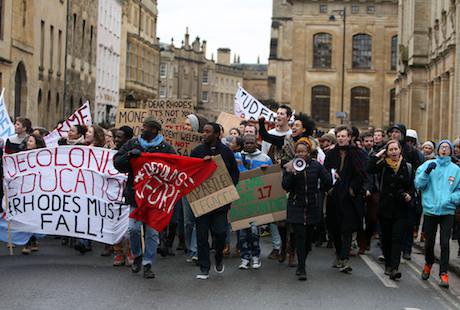

Protest in Oxford, 2016. Steve Parsons PA Archive/PA Images. All rights reserved.
A global student movement campaigning for the decolonisation of higher education has, over recent years, spread from the USA to South Africa and the UK. The demand is that universities acknowledge and take steps to ameliorate the ‘structural and epistemological legacy’ of colonialism. In practice, this has meant arguing for the removal of statues and plaques commemorating institutional sponsors from a bygone era who rose to fame and fortune through the brutal exploitation of ‘the colonies’. The Rhodes Must Fall campaign has called for statues of the imperialist Cecil Rhodes to be torn down from the University of Oxford in the UK and the University of Cape Town in South Africa. Individual universities in the UK, such as SOAS and Sussex, have their own decolonise campaigns, and in the USA there have been campaigns to have buildings and institutions founded from the financial legacy of the slave trade renamed.
But the decolonisation initiative has moved beyond the surface features of the university, to explore the very nature of knowledge propagated through higher education. The content of the curriculum, campaigners argue, continues to reflect and perpetuate a colonial legacy, through the presentation of a white, western intellectual tradition as not just superior to other forms of knowledge but as universal. Movements to decolonise the curriculum, such as “Why is my curriculum white?” which began at University College London, draw attention to the prevalence of white males especially on humanities programmes such as philosophy. The privileging of Kant, Plato and Descartes, they suggest, normalises a Euro-centric and Enlightenment-focused view of the world.
The current student movement to decolonise higher education presents colonialism not as an episode from history, but as a real impingement upon the present. Ntokozo Qwabe, co-founder of Rhodes Must Fall at Oxford, argues this point clearly: “A lot of the time when people talk about colonialism they think of it as a past event that happened. They don’t think about it as something that manifests itself in everyday life at institutions like Oxford.” In bringing colonialism out of the past and into the present, the decolonise campaigns appear to pitch politically radical students against irredeemably racist institutions full of pale, male and stale academics.
In practice, students campaigning for curricular change often find they are pushing at an open door. Universities, always keen for opportunities to demonstrate they listen to and act upon the student voice, are grateful for opportunities to work with engaged students. Students are offered seats at departmental committee meetings to ratify new modules and their views on curricular matters are solicited at every turn. So keen are universities to demonstrate high levels of student satisfaction that demands are sometimes pre-empted. At Queen Mary University in London, a plaque to the Belgian King Leopold, responsible for the massacre of millions in the Congo, was removed last year despite the fact that members of the student council had not voted for its removal.
When it comes to the curriculum, academics are again often ahead of the game in championing decolonisation. The pervasive influence of Critical Theory within humanities departments means that the days of expecting students to uncritically imbibe great books or enculturating a new generation into a monolithic western canon are long gone. Rather than desperately clinging on to the last vestiges of a traditional curriculum, many academics are all too ready to jettison the old. In a climate of postmodern relativism when works of literature and philosophy are simply ‘texts’, the specific curricular content no longer matters that much. In this regard, rather than posing a challenge to institutions, the decolonise the curriculum movement is simply confirming mainstream academic thought.
Academics who have not voluntarily diversified their reading lists and updated course content to make it more inclusive will find themselves under pressure to ‘internationalise the curriculum’. Although the vocabulary might be slightly different, the intention is the same: to decentralise the western intellectual tradition and the canonical works that comprised yesteryear’s higher education, in favour of teaching content that can be shown to represent biological, rather than intellectual, diversity. At its most cynical, this is a marketing technique, designed to attract revenue-generating international customers to British institutions.
Beyond cynicism, the international curriculum represents academics’ embarrassment at attempts to preserve and pass on intellectual traditions, that, though they may have emanated in the west, were one time considered to be of universal value. It represents a loss of faith in the ability of academics to judge some knowledge as superior, more important for students to know, than other knowledge. Rather than promoting cultural capital, many academics now prefer to inculcate skills. Geography, for example, is less about getting students to know and contribute towards geographical knowledge of the world, so much as it is about helping students “to develop a set of values and skills to operate in diverse cultural environments”. Geography, as a subject, is considered particularly well placed to do this because it has “a long history of introducing the destructive impact of colonialism to students, not just through an understanding of the ‘colonial present’ for example in the Middle East but also in looking at how the domination of the natural world can also be understood as a form of colonialism.”
Of course, there are many good reasons why universities and academics should keep the higher education curriculum under review. Knowledge should not be set in aspic but considered in new contexts. New research may lead to a re-evaluation of material that had previously taken a central place within the curriculum. The process of contesting what is important for students to know at any point in time is one of the most fruitful debates to be had, and it helps avoid the complacency that comes with teaching material simply because it has always been taught. Such discussions remind us what higher education is for and bring the role and responsibilities of academics in relation to a new generation of scholars to the fore. The curriculum, should, in short, be a changing and changeable entity. However, I would argue that the decolonise the curriculum movement, in all its guises, asks the wrong questions and results in changes that are entirely regressive.
Decolonise the curriculum promotes a relativism about knowledge that presents the works of different thinkers or different schools of thought as all being of equal worth. Decolonise SOAS is explicit in its demand that the university should “grant the same credence to metaphysical and transcendental systems of knowledge from the Global South as it does to systems of knowledge that have emerged from Western Europe.” This is a demand that judgements about the worth of knowledge move away from what are considered to be myths of ‘universal truth’. But the problem with this is that knowledge is not ‘different but equal’ and discussions about curricular content are precisely about differentiating superior knowledge – that which is worth preserving and passing on to a new generation – from inferior knowledge which is not.
The closer knowledge is to truth and the more it is considered to be universally relevant, the more worthy it should be of a place in the curriculum. To argue that ‘universal truth’ is a myth and that truth is context-dependent is to give up on the goals of education entirely – we have simply nothing to learn from previous generations or from each other. We can only indulge in the narcissistic enterprise of exploring our individual truths within our personal context.
In fact, the apparent relativism that appears to underpin the decolonise movement is disingenuous. All knowledge is not considered equal. Truth, when no longer universal, is perspectival. And in today’s university, some perspectives are more worth hearing than others. Decolonise the curriculum asks us to make decisions about knowledge based on biology rather than on intellectual merit. Instead of looking at what Hegel or WEB Du Bois, Audre Lorde or Sylvia Plath, have to offer in terms of their contribution to knowledge, we are asked to make crude judgements based on sex and skin colour with white and male being bad, black and female being better.
Once, Martin Luther King dreamt of a day that people would be judged by the content of their character rather than the colour of their skins and the Roman playwright Terence argued that nothing that was human was alien to him. Today, however, it seems that everything not uttered by someone of the same skin colour and preferably gender as me is entirely alien. The decolonise the curriculum movement re-racialises knowledge – and ultimately the university – in a most regressive way. Yet the trump card of biology silences criticism. I am quite convinced that the arguments I am putting forward in this piece will be viewed as symptomatic only of my white privilege!
The re-racialising of the university and knowledge assumed by the decolonise movement extends into its view of students. Black students are presented as a homogenous group, all equally traumatised by the historical legacy of colonialism. In reality, the black Oxford student who has been privately educated and is from a wealthy family background probably shares few experiences in common with the black student who has grown up on a council estate and currently attends a lower ranking university while simultaneously holding down a part-time job. The presentation of all black students as victims of the past masks real inequalities in the present.
Furthermore, promoting the view that walking past a statue on the way to class inflicts real psychic harm suggests black students are uniquely vulnerable and lacking in resilience. This assumption carries over into another argument driving the move to decolonise the curriculum: the racist and patronising view that black students can only learn if they see themselves, in a most basic, biological form, represented in the curriculum. This is to suggest that black students can only learn ‘black knowledge’ or, in other words, that black students can’t learn Kant or Shakespeare.
There are many good reasons to review and change what goes on in universities. The decolonise higher education movement is not among them. It represents a backward view of knowledge; it entrenches racial thinking, and it presents a degraded view of black students. It prompts a censoriousness driven by the demand that statues and curricular content be removed to white-wash the past in favour of a re-racialised present.
openDemocracy is partnering with the World Forum for Democracy, exploring the relationship between education and democracy. Read more here.
Read more
Get our weekly email

Comments
We encourage anyone to comment, please consult the oD commenting guidelines if you have any questions.